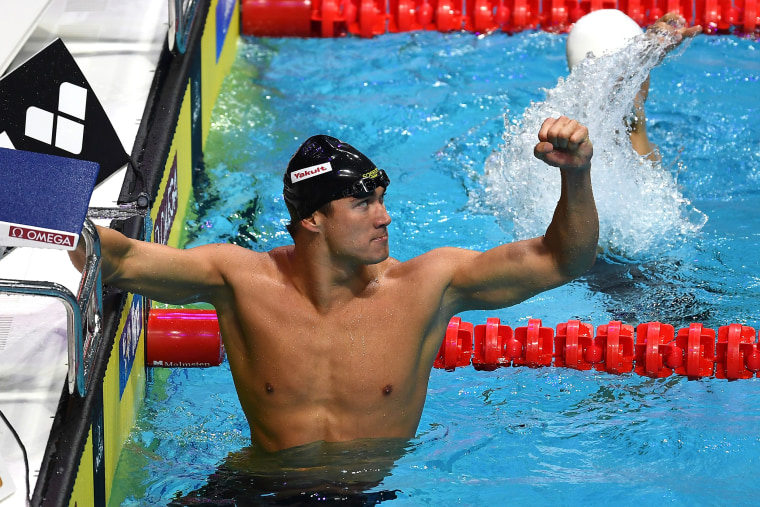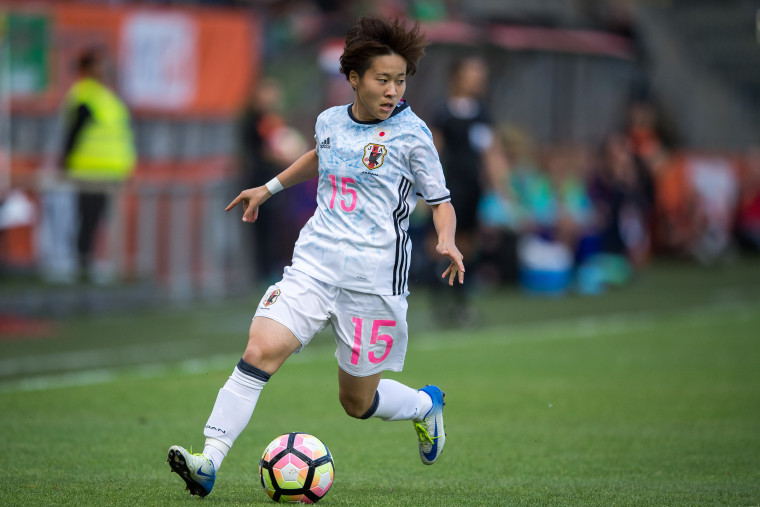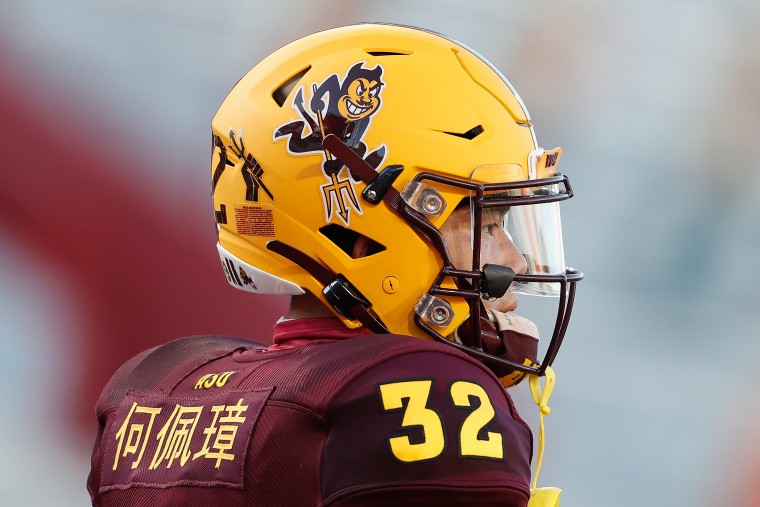During Asian Pacific American Heritage Month, TODAY is sharing the community’s history, pain, joy and what’s next for the AAPI movement. We will be publishing personal essays, stories, videos and specials throughout the entire month of May.
As more Asian and Asian American athletes have spoken out about their experiences with anti-Asian violence and racism, many of their peers have shared a similar thought when it comes to the larger public being educated about the issue.
“It’s about time,” Olympic swimmer Nathan Adrian told TODAY.
The documented rise in anti-Asian incidents across the country in the past year during the pandemic has motivated Asian athletes across the sports world to use their platform to bring awareness and push for solutions.

Athletes like NBA veteran Jeremy Lin, Atlanta Falcons kicker Younghoe Koo, tennis star Naomi Osaka, UCLA basketball player Natalie Chou, snowboarder Chloe Kim and multiple Olympians have shared their own experiences with racism and their anxiety about being in public during a time of rising assaults against Asians and Asian Americans.
“People are starting to speak up and we’re starting to do something about it,” said Adrian, a five-time gold medalist whose mother is from Hong Kong. “Just because there has been an uptick of it in the last year doesn’t mean it wasn’t happening before. Hopefully some good comes from this enlightenment.”
Lin shared earlier this year that he was called “coronavirus” on the court by an opposing player in an NBA G League game, while Koo wrote on Instagram that he has “heard the jokes and name calling” over the years in a statement following the fatal shootings of six women of Asian descent at Atlanta-area spas in March. Many athletes also shared the hashtag #StopAsianHate following the shootings.
Russell Jeung, a professor at San Francisco State University and the co-founder of the reporting forum Stop AAPI Hate, said athletes speaking out has been an important component in spreading awareness.
“I think that’s definitely helped,” he told TODAY. “It initially wasn’t getting much mainstream attention, but once Asian American athletes started talking about it and posting on social media, there was a lot more traffic.”
A report issued this month by Stop AAPI Hate found that there were 6,600 reports of anti-Asian hate incidents collected by the group between March 2020 and March 2021, with the majority against women and girls. While there was no breakdown of ones that occurred in an athletic setting, Jeung said they did receive multiple reports of harassment from Asian runners.
The COVID-19 pandemic has been cited by experts as a large factor in fueling anti-Asian incidents, yet the fact that cases and deaths have dramatically decreased and the country is opening up again during the vaccination effort has not slowed down the amount of anti-Asian occurrences.
“There’s a lot of fear, anger, scapegoating and grief that is Asian-focusing,” Jeung said.
The power of sports — good and bad
Sports have been a double-edged sword during the past year in that they have often helped bridge the cultural differences between Asian athletes and their teammates, but also have produced some ugly moments like the one Lin detailed earlier this year.
“Asian athletes can be in the ‘in group’ and the ‘out group,’” Jeung said. “They can bond with their teammates, but they can also be vilified by the opposing team and ‘othered.’ Rival fans can be pretty racist.”

Soccer player Yuka Nicole Momiki has the perspective of someone who was born in New York City, raised in Japan, and has now returned to the United States to play for the OL Reign, which is the Seattle franchise in the National Women's Soccer League. She was admittedly nervous about the treatment of the Asian community when she returned to the U.S. to play professionally.
“While I was growing up in Japan, I had never gotten any kind of discrimination,” Momiki told TODAY in an email. “So, when I imagined that it would happen to me one day, I felt scared and worried.”
Her experience with the Reign has been all positive.
“Fortunately, I have never experienced (racism in Seattle),” she said. “All my teammates, staff and fans warmly welcomed me. When I was transferred to the U.S., I had anxiety to be honest. But with the support of many people around me I have been able to have fun and take on new challenges so far.”
However, Washington Wizards forward Rui Hachimura, 23, who is the first Japanese player to ever be selected in the first round of the NBA Draft, has shown the other side of the coin.
The biracial son of a Japanese mother and Beninese father shared in a message in Japanese on Twitter this month that he gets hateful messages “almost every day” after his brother shared a screenshot of a racist, anti-Black message in Japanese telling him to “die” and that he was “born by mistake.”
Arizona State running back Jackson He can only shake his head when he hears about athletes like Hachimura and others enduring hateful words or worse. He, 23, was born in Shaoguan, China, and moved to California when he was 17 to finish high school.
“When I see those things happen, I just think there’s a lack of understanding and ignorance in this society,” He told TODAY. “We need to uplift each other.”
He has shown the power of sports to break down cultural barriers. The Sun Devils running back was one of the feel-good stories of last fall when he became the first Chinese-born player to score a touchdown at the highest level of college football.
He ran for the historic touchdown with the Chinese symbols for his name, He Peizhang, on the back of his jersey, which now rests in the College Football Hall of Fame in Atlanta.
“Sports connect people,” he said. “I had so many people showing me love after that (touchdown).”
He cited his friendship with Rachaad White, an African American running back at Arizona State, as something that sports helped facilitate. Their easygoing bond goes against the historical tension sometimes seen between the Black and Asian communities, which journalist Lisa Ling spoke about on TODAY earlier this month.
"There definitely is a generation divide I think in the Asian community," Ling said. "Previously, when people immigrated to this country, they came with their own racism and colorism that they brought with them to America, and this younger generation is not having that. Last year after the killing of George Floyd and Ahmaud Arbery and Breonna Taylor, young Asians hit the streets in ways that I had never experienced before because they as much as anyone are demanding social justice."
"I think there is something in terms of just this willingness and urgency to speak out and I think that's a beautiful thing," Lin said on TODAY about the younger generation.
The friendship between the two Arizona State running backs illustrates the point that the younger generation looks to break down racial barriers.

“We are from totally different backgrounds, but football brought us together,” He said. “It’s all about heart and the character of people that matters.”
Momiki has experienced a similar bond with non-Asian communities through sports.
“As my teammates, staff and fans accept me, it doesn’t matter where you come from or what you believe or what color you are,” she said. “We are always teammates, family, friends, sometimes rivals and we respect each other. Discrimination may disappear if we can respect each other across countries through sports.”
Carrying the weight
Many of the athletes who have spoken out also represent a small minority of Asian competitors in their respective sports.
Koo is one of the few Korean Americans in the history of the NFL, and Lin and Hachimura are two of only a handful of players of Asian descent in the NBA in recent seasons.
Trying to represent the entire Asian American community while competing can put a lot of pressure on athletes. On the one hand, they have the hopes of making an entire community proud, and on the other hand, they are just trying to be defined by their performance and not their race.
As the most prominent Asian American men's swimmer of his generation, Adrian, 32, has felt that weight. He has tried to block it out during competition, while embracing it away from the pool.
He has participated in many diversity camps over the years to help grow a sport where Asian Americans make up only 5.3% of the membership in USA Swimming, according to a 2017 report by the organization.
Carrying the hopes of the entire community on his broad shoulders while competing in three Olympics in his career could feel like an immense task at times.
"I have to mention, I don't think about that too much on a regular basis because it becomes a bit overwhelming for me personally," he said. "I've found this sweet spot of swimming for myself that is the right amount of stress that I need in order to perform. If it becomes too big or metaphorical in different ways, I tend to operate on a spectrum that gets to a level of anxiety."
Lin felt that pressure of representing the Asian American community acutely during the "Linsanity" days of his time starring on the New York Knicks nearly 10 years ago. He also alluded to it in an Instagram post on May 18 in which he addressed his professional basketball career.
"To the next generation of Asian American ballers — man, I so wish I could have done more on the NBA court to break more barriers — esp now — but you guys got next," he wrote. "When you get your shot, do NOT hesitate. Don't worry whether anyone else thinks you belong. The world never will. If there's any chance to doubt, they will. But when you get your foot in the door, KICK THAT DOOR DOWN. And then bring others up with you.
"I didn't get it done, but I have no regrets."
Pushing for concrete change
The hope is now that increased awareness of anti-Asian incidents leads to taking action to help stop it.
Adrian cited the group Compassion in Oakland, which consists of volunteers who accompany elderly Asian American people in the community in order to keep them safe, as an example of important action.
“It really stinks that it had to come to that, but I think community investment like that is so important,” Adrian said. “It inspires this ‘let’s take action’ type of mentality.”
Despite all the campaigns speaking out against AAPI hate incidents and the increased spotlight on them, they continue to occur with regularity.
That means there are still a lot of hearts and minds to reach for athletes with a platform.
“It’s like coaching football,” He said. “When they are teaching me, I might not get it right the first time, but you have to plant a seed in someone’s mind to get it right the next time. That’s what we need to do — plant that seed that we should spread love."